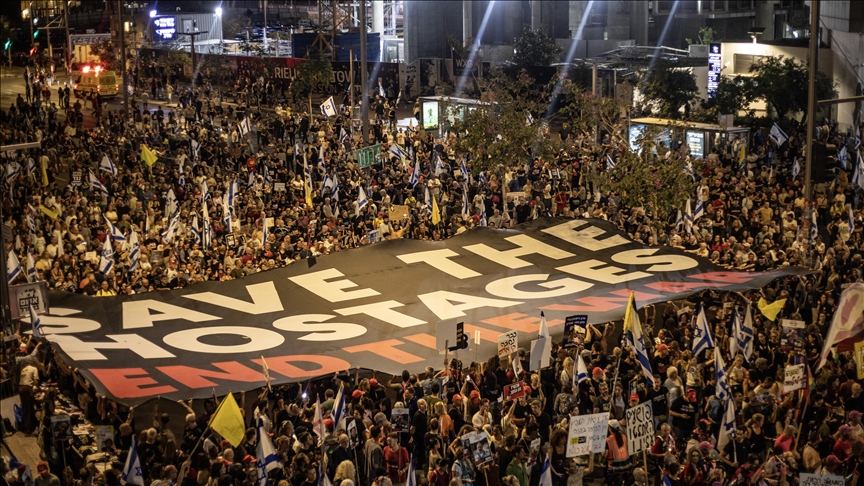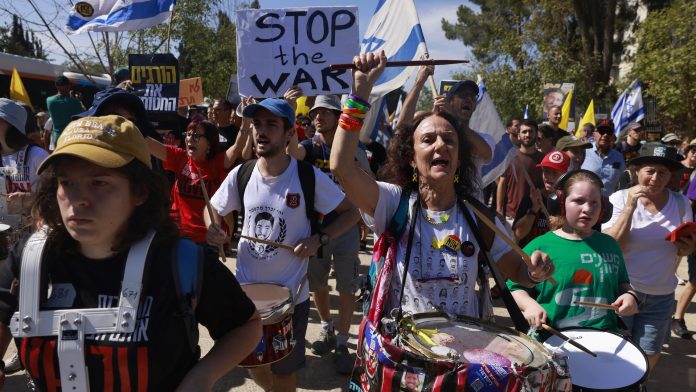On Sunday, demonstrators across Israel called for an end to the Gaza conflict and demanded the release of hostages held by militants. Prime Minister Benjamin Netanyahu and his allies sharply criticised the protests.
The rallies follow last week’s approval by Israel’s security cabinet to capture Gaza City, after nearly two years of hostilities that have left severe humanitarian conditions in the territory.
The conflict began on 7 October 2023, when the Palestinian militant group Hamas attacked Israel and took 251 people hostage. Forty-nine captives remain in Gaza, including 27 whom the Israeli military has confirmed dead.
In Tel Aviv’s Hostage Square, protesters unfurled a large Israeli flag displaying the portraits of the remaining hostages. The square has long served as a focal point for demonstrations.
Protesters also blocked roads, including the highway linking Tel Aviv and Jerusalem, setting tyres alight, according to local media. Israeli police arrested more than 30 people for disturbing public order.
Organisers called for a general strike on Sunday, Israel’s first day of the workweek.
Doron Wilfand, a 54-year-old tour guide, said at a Jerusalem rally: “It’s time to end the war, release all hostages and help Israel recover while moving towards a more stable Middle East.”
Prime Minister Netanyahu criticised the protests, saying they “harden Hamas’s position, delay the hostages’ release, and risk a repeat of the horrors of 7 October.”
Calls to “Shut down the country”
The Hostages and Missing Families Forum campaign group said protesters aimed to “shut down the country today with one clear call: Bring back the 50 hostages and end the war.”

The group includes relatives of a soldier killed in the 2014 war, whose remains Hamas still holds. Videos released by Hamas and its ally Islamic Jihad showing weak and emaciated captives have raised fears for their safety.
“If we don’t bring them back now, we will lose them forever,” the forum warned.
Egypt has renewed mediation efforts for a 60-day truce, including hostage release, after earlier talks in Qatar failed.
Some Israeli government officials criticised the demonstrations. Far-right Finance Minister Bezalel Smotrich called them “a perverse and harmful campaign that helps Hamas,” while Culture Minister Miki Zohar described the roadblocks as “a reward to the enemy.”
Opposition leader Benny Gantz accused the government of “attacking the families of hostages” while holding responsibility for their prolonged captivity.
AFPTV footage showed rallies at Beeri, a kibbutz near the Gaza border heavily affected by the October attack. Media reported protests in multiple locations nationwide.
Concerns over Gaza offensive
Plans to expand military operations into Gaza City and nearby refugee camps have drawn both international and domestic concern.
Army Radio reported that military chief Eyal Zamir would review “plans to capture Gaza City” later on Sunday. Residents would be evacuated before troops encircle and seize the city in the coming weeks. Tens of thousands of reserve soldiers will participate in the operation.
Israel announced plans to relocate civilians from combat zones to southern Gaza for safety.
UN-backed experts warn of a worsening famine, exacerbated by Israel’s restrictions on humanitarian aid. Gaza’s civil defence agency reported that Israeli fire killed at least seven Palestinians on Sunday while they waited for food aid.
Hamas’s October 2023 attack killed 1,219 people in Israel, mostly civilians, according to AFP figures. Israel’s offensive has killed more than 61,944 Palestinians, most civilians, according to Gaza’s health ministry, whose data the United Nations considers reliable.
